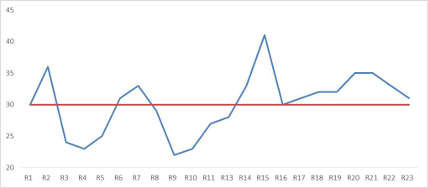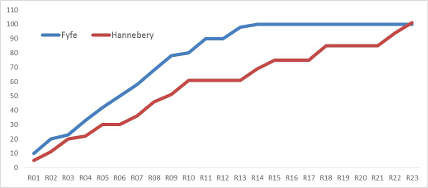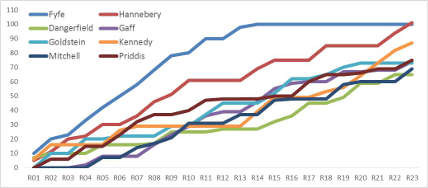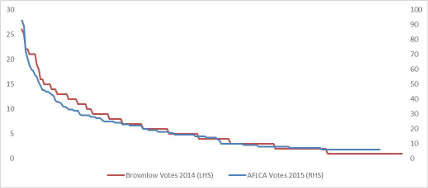WATCH: The post-goal snub that has reignited rumours of friction between Swan and teammates
Not a single Swan acknowledged Sam Wicks' second goal against Hawthorn on Sunday, with the apparent snub coming after he was left out of…
Disclaimer: I have absolutely no idea who is going to win the 2015 Brownlow Medal later on this evening.
What I do know, however, is that there is a very clear favourite. I also know that this is going to be an unusual count, with said clear favourite earning his keep in the opening rounds of the year.
What follows is a collection of thoughts, and a little bit of data to back them up, to help guide your thinking for the 2015 Brownlow Medal. What I would really like to do is hear who you think will win.
Why? Because the wisdom of many will almost always trump the ramblings of one. If you don’t want to read further, that’s okay, but I’d really love to get your thoughts as to who wins – skip to the bottom to find out how.
First things firsts. I am not Alfred Chan, unfortunately. I don’t have a quantitative model to help push things along. Those Wednesday columns don’t write themselves, after all.
Indeed, their validity is a little questionable, because what is ‘fairest’ and ‘best’ exactly? And the votes aren’t decided by one person, but by the 33 umpires that have officiated at the highest level in 2015.
One piece of quantitative information that does appear to be quite useful is the AFL Coaches Association award votes, if you tweak them a little. But more on that in a moment.
The Roar‘s own Josh Elliott has a little something on each of the contenders, so let’s not waste kilobytes recapping.
Broadly speaking, this is the list of potential medallists, in order of their market odds:
Nat Fyfe (Fremantle)
Matt Priddis (West Coast)
Patrick Dangerfield (Adelaide)
Dan Hannebery (Sydney)
Sam Mitchell (Hawthorn)
Todd Goldstein (North Melbourne)
Josh Kennedy (Sydney)
Andrew Gaff (West Coast)
The rest are 50-1 or higher – the market reckons this is the field.
Although, Priddis was a 40-1 prospect heading into the 2014 count. So anything could happen. But you would think the market won’t get it wrong two years in a row, right?
Priddis sticks it right up ’em
The 2014 Brownlow medallist has had a better year in 2015 than he did in 2014. And not only on the stats sheet, but as an influential player. Let’s run through the numbers though:
Contested possessions: 15.0 (2015) | 15.0 (2014)
Clearances: 7.7 | 6.7
Kick/handball ratio: 0.503 | 0.712
Scoreboard (goals, behinds, assists): 1.45 | 1.13
The same number of contested possessions, but more clearances, a greater use of the handball (suggesting he’s spending more time under the umpires’ noses), while his direct scoreboard impact is up. But it’s not just on the stats sheet, he’s playing a greater role once the ball gets out of congestion.
But will he win it? I don’t think so. And he can blame the stronger performances of those around him in 2015, compared to 2014.
Last season, Priddis was essentially a lone hand for West Coast in a number of games, as the midfield that we see carving up the competition resembled something more akin to a WAFL reserves side.
While the Eagles have played in five-and-a-half more victories, which all things being equal would imply a stronger share of votes to West Coast players, the likes of Gaff (the umpires, we’re told, look at the stats at the end of the game before casting their votes), Josh Kennedy and Mark LeCras (in big bag games) and even Nic Naitanui may pinch a couple off of him in the middle of the year.
But Gaff will spoil the party
But the man most likely to do so is Gaff. He’s one of the 20-1 major outsiders, and to my mind is only in the frame because of the sheer volume of possessions. That’s what got him into the All-Australian team, too. Someone’s got to get them, sure, but tell me when Gaff has won a game for the Eagles? His role in the night may be a spoiler for Priddis.
For example, Priddis had eight clearances, 15 contested possessions and six inside 50s in Round 16, which the sharps say is a near certainty for the three votes. But Gaff had 28 uncontested possessions. Who gets the three in that one?
Mitchell makes things interesting
The league’s other uncontested beast in 2015 was Mitchell, who with Gaff was the only other player to rack up more than 20 on the outside during the season. In Mitchell’s peak Brownlow year, 30 votes in 2011, Mitchell was similarly damaging on the outside, averaging some 19 uncontested possessions.
But he mixed that year in with leading the Hawks in clearances and contested possessions, too. Everything ran through him. This season, Hawthorn have been ruthlessly flexible, and while Mitchell has been very important…
Wait… Mitchell led Hawthorn for uncontested possessions. And contested possessions… and clearances. Well then.
But unlike Gaff, Mitchell is influential. But one thing that will count against him is that his big number games came in losses, particularly for uncontested possessions. More than an outside chance here, for sure.
Ruckmen don’t win
The market’s sneaky chance looks to be North Melbourne ruckman Todd Goldstein. As a ruckman, I think we can rule him out. Next.
Not really. But let’s be real for a minute: this is a midfielder’s award. That’s just how it’s evolved. The last non-midfielder to win the award was Melbourne’s Jim Stynes in 1991, some 24 years ago.
In Goldstein’s favour is that there haven’t been a lot of standout midfielders at North Melbourne this year – although I’ve seen some sneaky talk about Ben Cunnington in recent days. Cunnington has had a number of those eight-clearance, 15-contested possession games, and has done so in games that Goldstein has dominated in the ruck. Cunnington won’t win, of course, but he could prove a spoiler.
Outside of Cunnington, though, there’s not likely to be a lot of sustained vote pinching going on at Arden Street. But he’s cursed with Ruckman’s Disease, and for better or worse (I say absolutely worse) he just won’t poll votes. This has 2014 Lance Franklin written all over it.
Sydney a genuine double chance this time
One of the more interesting wrinkles of this count is the two Sydney lads, Dan Hannebery and Josh Kennedy. Let’s deal with the latter first. Here’s how Josh Kennedy’s season looks from a total possessions perspective.

After vacillating around the 30 possession mark for the first 12 games of the season, Kennedy then strung together an AFL-record 11 straight games of 30 or more touches. He’s been a consistent vote getter since 2012, polling 54 votes in the past three years. But would you believe, that only makes him the eighth strongest vote getter over that time period. This stat is important for someone else in contention, but we’ll get to them in a moment.
Kennedy is likely to add some spice to the run home, but his very pedestrian first half of the year will leave him a little short. He also has a strong competitor at home, in Hannebery. The running machine won the AFL Coaches’ Association award, which is the only other award handed out on a game-to-game vote basis.
Where Hannebery has an advantage is he’s played both inside and outside roles this year. All things being equal, this means he’s moving to where he can be most influential, or is influencing the way games are being played. He hasn’t received big votes in the past, but when it comes to the Brownlow past reputation doesn’t count for a lot (otherwise Scott Pendlebury and Joel Selwood would have won one by now).
Hannebery’s season has been breakout, averaging 30 disposals, 4.5 clearances, four inside 50s and five tackles; with a 13-17 split on kicks and handballs, and 11-19 split on contested versus uncontested. His has been a great, all-round season.
Hannbery’s had some huge games, including five with 35-plus disposals (two of those 40-plus), seven games with more than five clearances, and 10 games with more than 20 uncontested possessions. He looms as a very strong challenger for the title, which is reflected in the shortening of his price relative to earlier in the year.
High voltage
Right, so back to that stat on votes in the past three years. The leader in that is Gary Ablett Jr (duh). But who do you think is in second place? None other than Geelong’s own Adelaide’s own, Patrick Dangerfield:
| Player | Votes | Games Played | Games Polled |
| Ablett, Gary | 74 | 56 | 32 |
| Dangerfield, Patrick | 66 | 64 | 27 |
| Cotchin, Trent | 63 | 65 | 27 |
| Selwood, Joel | 62 | 64 | 27 |
| Fyfe, Nat | 57 | 46 | 26 |
| Swan, Dane | 56 | 57 | 23 |
| Watson, Jobe | 55 | 55 | 24 |
| Kennedy, Josh | 54 | 64 | 23 |
| Pendlebury, Scott | 52 | 61 | 26 |
| Johnson, Steve | 52 | 54 | 21 |
| Mitchell, Sam | 50 | 55 | 25 |
| Thompson, Scott | 48 | 63 | 21 |
| Priddis, Matt | 48 | 63 | 23 |
| Hannebery, Dan | 44 | 59 | 19 |
| Rockliff, Tom | 44 | 61 | 20 |
| Mundy, David | 41 | 61 | 16 |
| Boak, Travis | 40 | 60 | 19 |
| Jack, Kieren | 39 | 65 | 20 |
| Beams, Dayne | 36 | 47 | 17 |
That’s right. Dangerfield has polled an average of 22 votes per year in the past three years, a tally which would have been enough to win the 2005 Brownlow, or share in the 2003 three-way finish with Mark Ricciuto, Nathan Buckley and Adam Goodes. Now the top of that table is very crowded, but to me it’s a meaningful statistic in this context, because unlike Trent Cotchin and Joel Selwood, Dangerfield has had a career best year in 2015.
Dangerfield is the definition of an influential player. I mean, how many times has he taken a clearance off of his team’s ruckman, burst through a pack, got the ball forward, followed up his work and kicked a goal this year? Somewhere north of eleventy. He’s averaged 27 disposals, very nearly a goal a game, seven clearances, five inside 50s, and some 15 contested possessions. He’s almost averaging that holy grail of 15-8 that’s crucial to Brownlow votes.
As far as individual games go, there’s plenty of slam dunk three-vote performances here: Round 5, Round 8, Round 10, Round 16, Round 17, Round 20. The interesting one will be the Dangerfyfe game in Round 9, where number 32 had a ridiculous 29 contested possessions (versus Fyfe’s 26). If he gets that one, too, that’ll take him to 21 votes in seven games, leaving him a further 14 games in which to grab votes.
The question on everyone’s lips is: will it be enough to beat Fyfe’s first half of the season, which will likely go down as one of the best half-season performances in the modern AFL era.
Breaking legs, and records
A stinging defeat to Hawthorn, and knock to a troublesome leg, on Friday will dampen the mood of Fyfe, but I have a strong sense that he’ll be able to get over it for an hour or two. Although, a couple of things certainly count against him.
First of all, Fyfe only played 18 regular season games, which would be the fewest number of games played by a victor since Gavin Wanganeen in 1993 (and he polled just 18 votes – the second fewest by a victor in the history of the 3-2-1 system).
But that may not matter, because Fyfe played the pants off of those 18 games. He had no fewer than 12 contested possessions in a single game (only 19 players averaged more than that over the full season), and put up video game numbers in a couple of matches.
There was a 36-disposal, three-goal, 25-contested possession effort in Round 2; 10 clearances in Round 3, 18 contested possessions and eight clearances in Round 5; and seven clearances, five inside 50s and 15 contested possessions in Round 6.
Then he had 30 touches (20 contested) and three goals in Round 7; 37 disposals, 21 contested possessions and 11 clearances in Round 8; and 40 disposals, 10 inside 50s, 14 clearances and 26 contested possessions in the Round 9 Dangerfyfe game.
You get the idea. The bloke wasn’t heating up: he was on fire!
The speculation is that he’ll poll three votes in each of his first 10 games, and then basically not poll for the rest of the season. Let’s be real for a second minute. He’s not going to poll 30 votes in 10 games – and he’s almost certainly going to poll a few times post Round 10. If you ask me, he’s the one to beat.
The data
So, anyway, let’s get to the data. The AFL Coaches’ Association awards are voted on by the coaches in each game, on a 5-4-3-2-1 basis. Both coaches vote independently, and can vote for their players or the opposition. Hannebery won the award this year, edging over Fyfe in the final round of the season by a single vote. Unsurprisingly, his price for the Brownlow plunged as a result.
This is what the Fyfe versus Hannebery race looked like over the season:

That looks like it fits the narrative, right? Fyfe polling pretty consistently early in the season, before stagnating at 100 points from Round 14 onwards. How does the curve compare if we put all of the contenders on here?

It’s very crowded around that second tier. Sydney’s Kennedy does break out in the final few rounds, while Goldstein looks to top out around the Round 18 mark. Interestingly, Dangerfield is the worst out of the contenders – that is surprising to me, given his impact. Perhaps some spiteful opposition voting is in play?
I jest. So this is interesting. But you know what’s more interesting? If we try and make this 5-4-3-2-1 voting structure similar to the Brownlow medal 3-2-1. I’ve done that by excluding any votes earned by a player that tally to less than six for any one game.
Why six? It means that at a bare minimum the player has earned votes from both coaches, and that in circumstances where a player isn’t rated as the best or second best by one coach that they can only be counted if both think they were in the top three.
It’s not perfect, sure. One flaw is that it excludes players that were rated as the top player by one coach, but didn’t get votes from another. The problem here is that there’s no way of telling which coach voted for which player.
So a ‘five’ could be a 5-0, 4-1 or 3-2 split. A 5-0 split would possibly figure in the Brownlow votes, but I’d hazard a guess that a) there’s not likely to be many instances of this happening, and b) six votes distributed by two coaches is likely to be more predictive.
And hey, it actually works quite well. Here’s how the votes are distributed using this approach, compared to last year’s Brownlow count.

So, who comes out on top of the adjusted AFLCA votes?
| Nat Fyfe | 93 |
| Dan Hannebery | 89 |
| Josh Kennedy (Syd) | 72 |
| David Mundy | 67 |
| Andrew Gaff | 63 |
| Todd Goldstein | 60 |
| Sam Mitchell | 59 |
| Dustin Martin | 56 |
| Matt Priddis | 55 |
| Scott Pendlebury | 51 |
| David Armitage | 49 |
| Patrick Dangerfield | 46 |
| Josh Kennedy (WCE) | 46 |
| Bernie Vince | 45 |
| Chad Wingard | 45 |
Well that complicates matters. While Fyfe wins, the top four players come from two teams – with Fremantle’s David Mundy rocketing to the top of the leaderboard. Will that ruin it for Fyfe?
So there we have it. Some things considered here, Fyfe is the one to catch, with Sydney’s Hannebery the one most likely to cause him a little bit of grief towards the end of the count. Hawthorn’s Mitchell is certainly in the count, given his and Hawthorn’s year. He and Dangerfield are almost inseperable for me, but I went with the proven 30-vote getter Mitchell.
This is where you come in. Who do you think has the count won? Submit your top three in the comments below, like so if you want it to count, and I’ll tally them up and publish the results towards the end of the night. And of course, head over to the live blog a little later on today to follow the count surname by surname by mispronounced surname.
1. Nat Fyfe
2. Dan Hannebery
3. Sam Mitchell